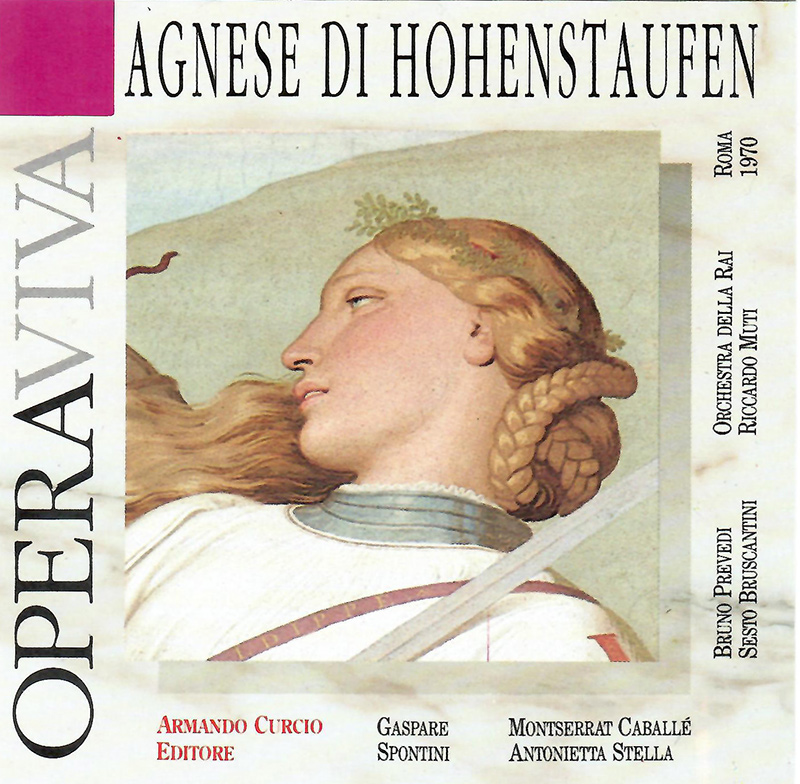Logowanie
Dziś nikt już tak genialnie nie jazzuje!
Bobby Hutcherson, Joe Sample
San Francisco
SHM-CD/SACD - NOWY FORMAT - DŻWIĘK TAK CZYSTY, JAK Z CZASU WIELKIEGO WYBUCHU!
Wayne Shorter, Freddie Hubbard, Herbie Hancock, Ron Carter, Elvin Jones
Speak no evil
UHQCD - dotknij Oryginału - MQA (Master Quality Authenticated)
Chesky! Niezmiennie perfekcyjny
Winylowy niezbędnik
ClearAudio
Double Matrix Professional - Sonic
najbardziej inteligentna i skuteczna pralka do płyt winylowych wszelkiego typu - całkowicie automatyczna
SPONTINI, Montserrat Caballe, Antonietta Stella, Sesto Bruscantini, Orchestra Sinfonica e Coro di Roma della RAI, Riccardo Muti
Agnese Di Hohenstaufen
- Montserrat Caballe - soprano
- Antonietta Stella - soprano
- Sesto Bruscantini - baritone
- Orchestra Sinfonica e Coro di Roma della RAI - orchestra
- Riccardo Muti - conductor
- SPONTINI
madamemusico 5.0 out of 5 stars Superb performance of an underrated opera Reviewed in the United States on July 18, 2004 Gasparo Spontini's "Agnes von Hohenstaufen," here sung in Italian to a cut version of the score, provides a wonderful view of a highly underappreciated score. The original opera was written in German (because Spontini was Court Composer in Berlin at the time) and lasted around four hours--a fatal flaw which led to its non-popularity--set to a rather confused and turgid libretto. But this work is much like Verdi's "Il Trovatore," which also has a flawed and confused text set to some of the most stunning music imaginable. Spontini was virtually the creator of massed choral and vocal scenes with shifting rhythms and harmonies within a continuous flow, and so was really Wagner's predecessor. (Wagner greatly admired Bellini's "Norma," Meyerbeer's "Les Huguenots" and the operas of Spontini and Berlioz.) Indeed, this continuous musical flow is one of many things that sets Spontini apart from his more famous "bel canto" brethren, even from early Verdi who followed in their footsteps. And the music is truly stunning. In the finale of Act 2, for instance, one hears the four principal soloists singing a polyphonic ensemble against the massed orchestra and chorus to their left, while to their right and offstage one hears a chorus of nuns singing to the accompaniment of what sounds just like an organ. But Berlioz, in his "Evenings With the Orchestra," points out that this was NOT an organ but a small body of wind instruments who mimic an organ to perfection. In such small but important details one realizes the great genius of Spontini. The singing is by and large superb, though in my view Montserrat Caballe lacks the grand dramatic note necessary for this role. Don't get me wrong, she had a gorgeous voice and could float like an angel, but feeling the drama "from the inside" the way Callas, Suliotis and Gencer were able to do, was quite beyond her powers. In this very early example of his powers, Riccardo Muti conducts with drama and passion, and the cast is remarkably stellar for a revival of what was then (and remains today) a little-known work. In addition to Caballe and the fine tenor Bruno Prevedi, we also get Antonietta Stella in the second soprano role, the excellent Italian bass Ferruccio Mazzola, and two of Italy's finest baritones of the era, Sesto Bruscantini and Giangiacomo Guelfi (who was NOT a tenor as another reviewer has mentioned). This luxury casting brings out the best in the music, which is noble, lyrical and expressive. One will also note that Spontini, unlike his bel canto brethren, worked primarily with the middle ranges of his voices, not the high range as they (and Verdi) liked to exploit. Though the sound is a trifle boxy, it is real stereo, which adds to your enjoyment of the work. Highly recommended despite the lack of a libretto.


































